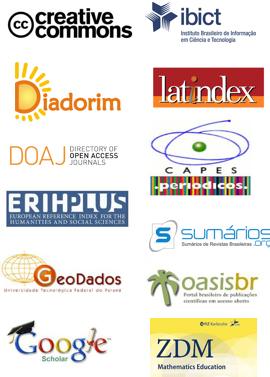Contribuições do Desenho Universal para Aprendizagem para professores que ensinam Matemática a alunos com deficiência visual: um estudo bibliográfico
DOI:
https://doi.org/10.17921/2176-5634.2021v14n3p329-338Resumo
Resumo
A inclusão escolar de alunos pertencentes ao público-alvo da educação especial, principalmente aqueles com deficiência visual, implica o enfrentamento de desafios importantes. Estudos indicam a necessidade de formação apropriada de professores, a inclusão desses educandos em escolas regulares e/ou Atendimento Educacional Especializado (AEE) como tópicos fundamentais de reflexão para a eficácia do ensino nesse contexto. O objetivo deste artigo é investigar a produção científica desenvolvida no campo da Educação Matemática a respeito do uso do Desenho Universal na perspectiva da Educação Matemática Inclusiva no Brasil. Para tanto, foram selecionados 14 trabalhos por meio da Biblioteca Digital Brasileira de Teses e Dissertações, que foram analisados e divididos em três categorias: 1. Desenho Universal para Aprendizagem e Educação Matemática Inclusiva; 2. Desenho Universal para Aprendizagem; e 3. Educação Matemática Inclusiva. O levantamento constatou que há pouca produção acadêmica envolvendo a primeira categoria, o que corrobora com a pertinência, relevância e contribuição deste estudo, uma vez que pretendemos, a partir dessa revisão bibliográfica, desenvolver dissertação de mestrado com o objetivo de propor novas perspectivas para o processo de ensino e aprendizagem em salas de aula inclusivas, com alunos sem e com deficiência visual.
Palavras-chave: Inclusão. Educação Básica. Acessibilidade. Cego. Escola.
Abstract
The school inclusion of students in special education, especially those blind and with low vision impairments, implies facing challenges. Studies indicate as fundamental topics for reflection about the effectiveness of teaching in this context: the demand for appropriate teacher training and the inclusion of visually impaired students in regular schools and/ or in Specialized Educational Service (SES) institutions. The objective of this article is to investigate the scientific production developed in the field of Mathematical Education regarding the use of Universal Design for Learning from the perspective of Inclusive Mathematical Education in Brazil. For that, a research was carried out in the database Biblioteca Digital Brasileira de Teses e Dissertações and fourteen works were selected for review based on the goal of this study. The findings were divided into three categories: (1) Universal Design for Learning and Inclusive Mathematical Education; (2) Universal Design for Learning; and (3) Inclusive Mathematical Education. After the survey, it was found that there are few studies involving the first category, a factor that corroborates the relevance and contribution of this study, since we intend, from this bibliographic review, to deepen the research by producing a master's dissertation, which aims to propose new perspectives to assist the teacher in the teaching and learning processes of Mathematics in inclusive classrooms, for students with and without visual impairment.
Keywords: Inclusion, Basic Education, Accessibility, Blind Person, School.


